
Plaza del Obispo: The Heart of Málaga
Experience the vibrant atmosphere and rich history of Plaza del Obispo, the heart of Málaga, surrounded by stunning architecture and delightful local cuisine.
Plaza del Obispo is a vibrant town square in the heart of Málaga, brimming with history, culture, and a lively atmosphere. Surrounded by stunning architecture and local eateries, it serves as a perfect spot for tourists to soak in the essence of the city.
A brief summary to Plaza del Obispo
- Málaga, Centro, Málaga, ES
Local tips
- Visit early in the morning or late afternoon to avoid crowds and enjoy a quieter experience.
- Bring a camera to capture the stunning architecture of the Málaga Cathedral and the surrounding buildings.
- Try the local tapas at one of the nearby restaurants for an authentic taste of Andalusian cuisine.
- Check for local events or performances happening in the square during your visit for a chance to experience local culture.
Getting There
-
Car
If you are driving, take the A-7 motorway towards Málaga. Follow signs for Málaga Centro and merge onto the MA-20. Take exit 3 towards Av. de Andalucía, and then continue straight onto Av. de Andalucía. Continue onto Calle Cuarteles. Follow the road until you reach Plaza del Obispo, which is located in the Centro district. There are several public parking options nearby, such as the Parking Centro Histórico. Expect to pay around €1.50 per hour.
-
Public Transportation - Bus
To reach Plaza del Obispo by bus, use the local bus service. Look for lines 1, 3, or 19, which all stop near the city center. Board the bus at your nearest stop and pay the fare, which is approximately €1.30. Disembark at the 'Plaza de la Constitución' stop. From there, it's a short 5-minute walk to Plaza del Obispo. Head east on Calle Larios, then take a left onto Calle Granada, and you will see Plaza del Obispo ahead.
-
Public Transportation - Train
If you are coming from nearby towns, you can take a train to Málaga's main train station, María Zambrano. From the station, you can either walk (about 20 minutes) or take a local bus (lines 1, 3, or 19) towards the city center. If walking, exit the station and head south to Av. de la Aurora, then turn right onto Calle Larios, continuing until you reach Plaza del Obispo.
Discover more about Plaza del Obispo
Iconic landmarks you can’t miss
Plaza del Obispo
0.0 km
Experience the vibrant atmosphere and rich history of Plaza del Obispo, the heart of Málaga, surrounded by stunning architecture and delightful local cuisine.
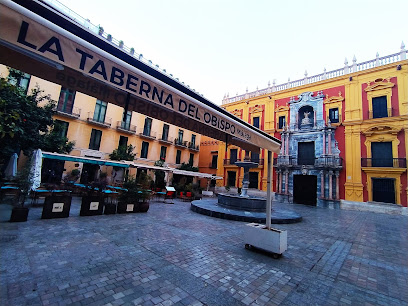
Fuente Plaza del Obispo
0.0 km
Explore the enchanting Fuente Plaza del Obispo, a historic square in Málaga filled with culture, beauty, and local charm.
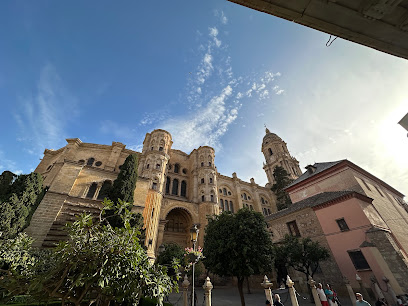
Centro Cultural Fundación Unicaja de Málaga
0.0 km
Explore the Centro Cultural Fundación Unicaja, a vibrant museum in Málaga showcasing art, culture, and community engagement through diverse exhibitions and events.
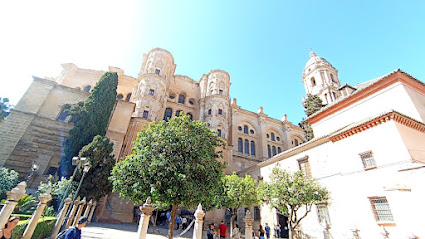
AQUI NACE EMILIO PRADOS
0.1 km
Explore the cultural heritage of Málaga at the birthplace of Emilio Prados, a significant poet of the Generation of '27.
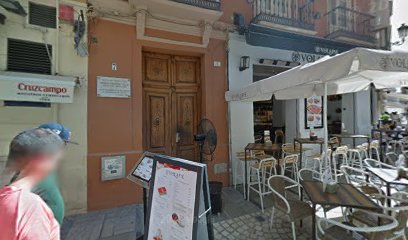
Patio de los Naranjos
0.1 km
Discover the tranquility of Patio de los Naranjos, a beautiful garden in Málaga filled with fragrant orange trees and rich history.
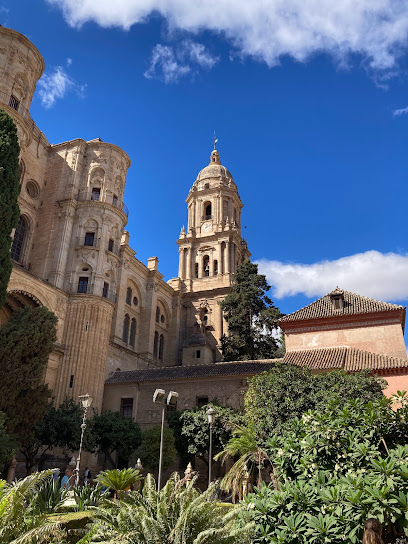
Esculturas Funambulistas
0.1 km
Explore the captivating Esculturas Funambulistas in Málaga, where art meets urban life in a stunning display of creativity and culture.
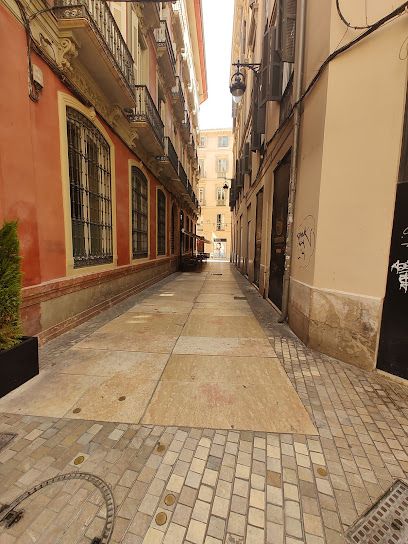
Chiromantic Bird Sculpture
0.1 km
Explore the Chiromantic Bird Sculpture in Málaga, a stunning blend of art and culture that captures the essence of urban creativity in Southern Spain.
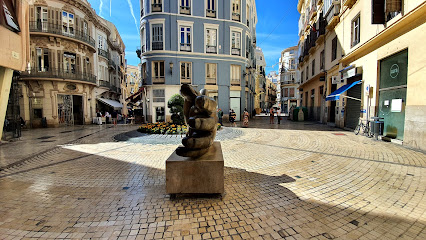
Centro Pompidou Málaga
0.2 km
Discover the artistic essence of Málaga at the iconic Centro Pompidou, a vibrant cultural hub showcasing contemporary masterpieces and stunning coastal views.
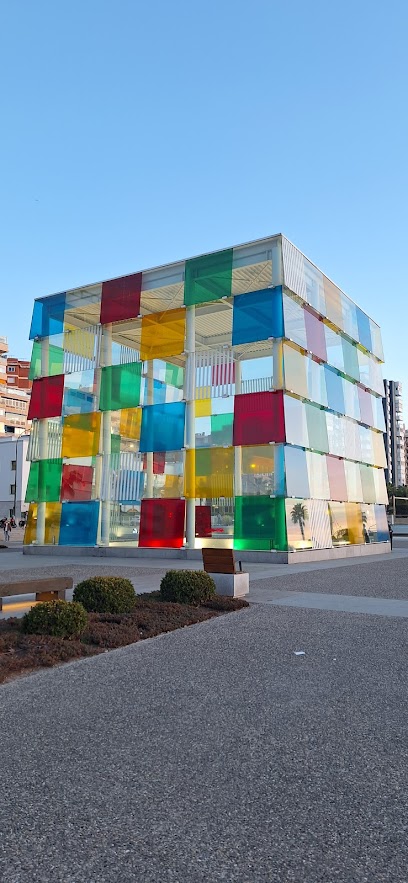
Pasaje Chinitas
0.2 km
Discover the vibrant charm of Pasaje Chinitas in Málaga, where history meets culture, and culinary delights await around every corner.
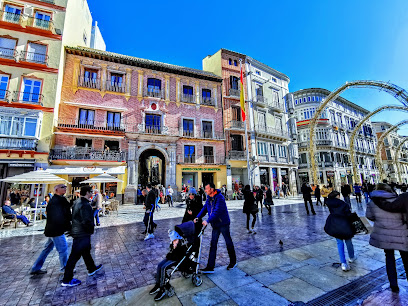
Bandera de España
0.2 km
Explore the Bandera de España in Málaga - a cultural landmark that embodies the heart and soul of the city with its vibrant atmosphere and rich history.
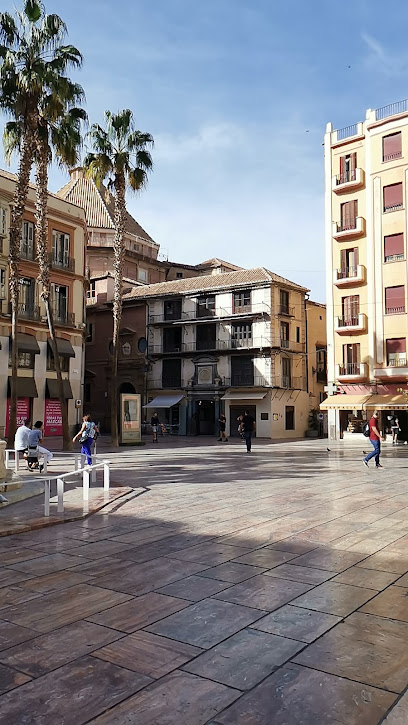
Petit Palais
0.2 km
Explore the artistic heritage and serene atmosphere of Petit Palais, a captivating tourist attraction in the heart of Málaga, Spain.
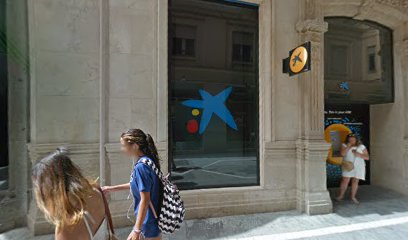
Calle Granada
0.2 km
Discover the historical charm of Calle Granada in Málaga, where vibrant culture meets stunning architecture in the heart of the city.
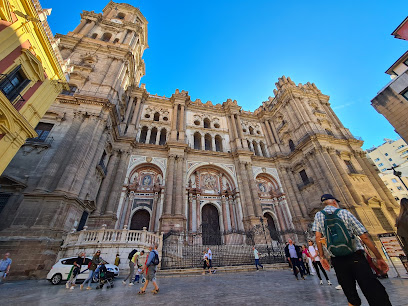
Centro de Málaga
0.2 km
Experience the vibrant heart of Málaga at Centro de Málaga, a historical landmark filled with culture, stunning architecture, and lively atmosphere.
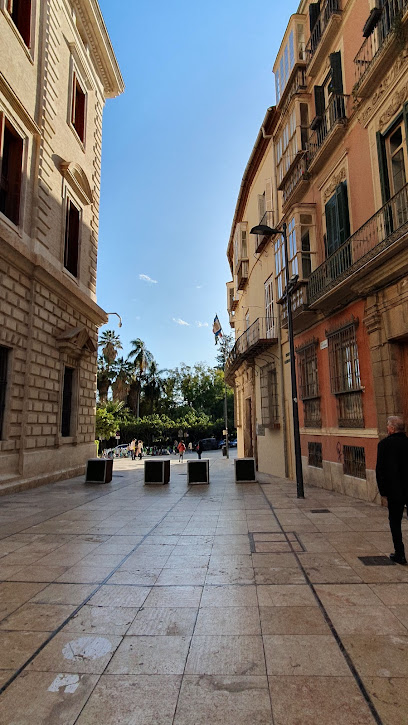
Pl. de la Constitución, 3
0.2 km
Explore the vibrant heart of Málaga at Plaza de la Constitución, where history, culture, and modern life converge in a stunning urban setting.
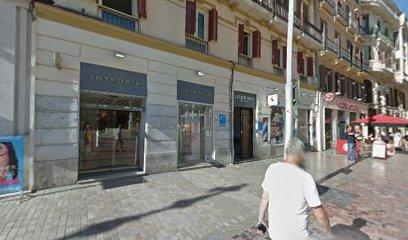
la giralda
0.2 km
Discover the architectural beauty and historical significance of La Giralda, a must-see landmark in the heart of Málaga, Spain.
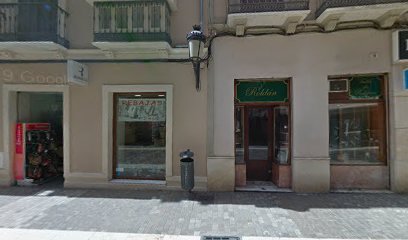
Unmissable attractions to see
Santa Iglesia Catedral Basílica de la Encarnación
0.1 km
Experience the stunning beauty and spiritual depth of Málaga's Santa Iglesia Catedral Basílica de la Encarnación, a blend of architectural styles and rich history.
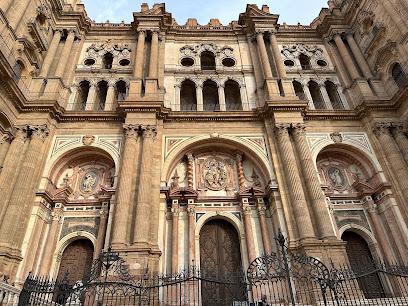
KAPOK TREE
0.1 km
Experience the breathtaking Kapok Tree in Málaga, a majestic natural landmark that embodies the city's ecological charm.
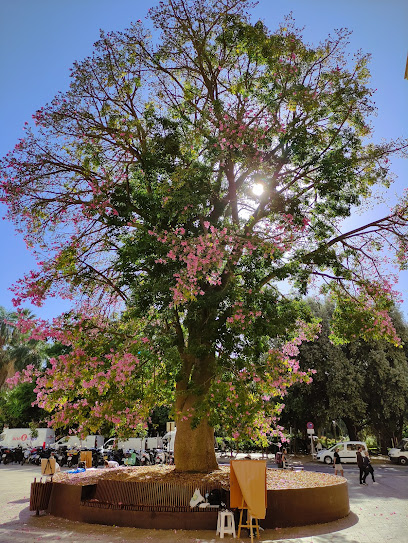
Museo Revello de Toro
0.2 km
Explore the Museo Revello de Toro in Málaga, where art and culture come alive through the masterpieces of renowned Spanish painter Félix Revello de Toro.
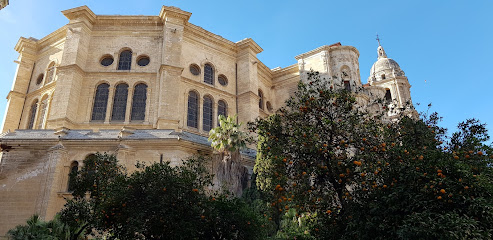
Centro Histórico
0.2 km
Explore the vibrant Centro Histórico of Málaga, a treasure trove of history, culture, and culinary delights in the heart of Andalusia.

Málaga City Adventures
0.2 km
Experience the best of Málaga with Málaga City Adventures, your premier tour agency for unforgettable local experiences and cultural exploration.

Plaza de la Constitución
0.2 km
Discover the vibrant charm of Plaza de la Constitución in Málaga, where history, culture, and local flavors come together in a stunning urban oasis.
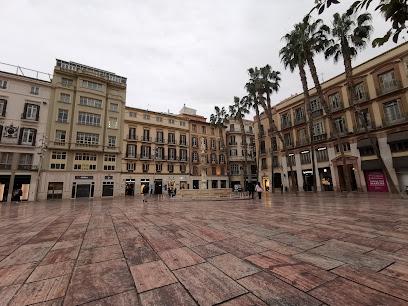
Marti Torres
0.2 km
Discover the architectural beauty and historical significance of Marti Torres in the heart of Málaga's vibrant Plaza de la Constitución.
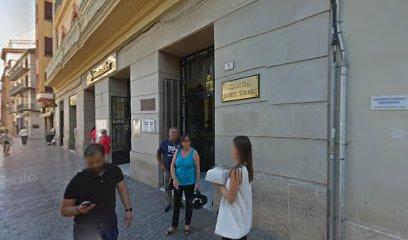
Museo Picasso Málaga
0.2 km
Explore the rich artistic heritage of Pablo Picasso at the Museo Picasso Málaga, located in a stunning historic palace in the heart of the city.
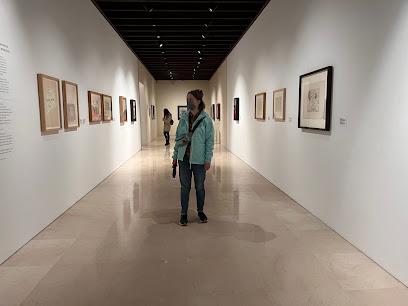
Malaga Museum
0.3 km
Explore the artistic heritage of Andalusia at Málaga Museum, a cultural treasure nestled in the heart of the city.
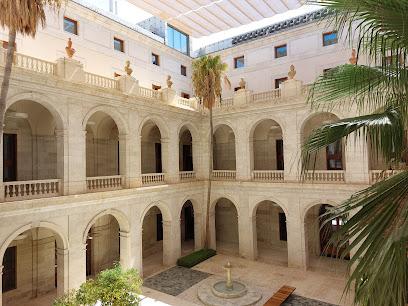
Pl. de Uncibay
0.3 km
Experience the vibrant culture and history of Málaga at Pl. de Uncibay, a bustling square filled with charm and local delights.
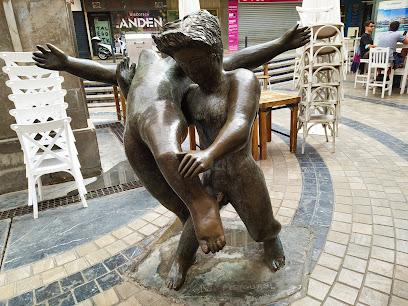
Cooltoural
0.3 km
Experience the vibrant culture and history at Cooltoural, a must-visit tourist attraction in the heart of Málaga, Spain.
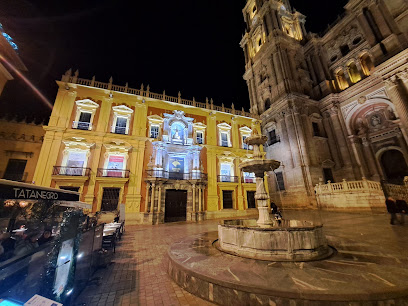
Rapto de las Sabinas, escultura
0.3 km
Explore the captivating 'Rapto de las Sabinas' sculpture in Málaga, where art meets history in the heart of Spain's cultural gem.
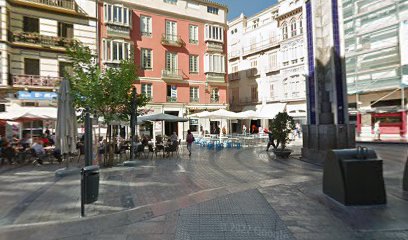
Old Town Irish Pub
0.3 km
Experience the warmth of Irish hospitality in the heart of Málaga with traditional cuisine and a vibrant atmosphere at Old Town Irish Pub.
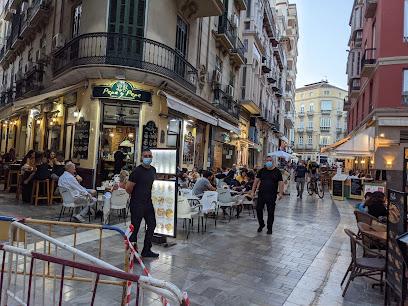
Raices y Alas
0.3 km
Explore Raices y Alas in Málaga, a captivating tourist attraction offering a glimpse into the rich culture and history of Andalusia.
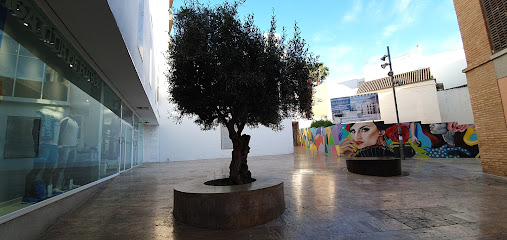
Museo Carmen Thyssen Málaga
0.3 km
Explore the depth of 19th-century Spanish art at Museo Carmen Thyssen Málaga, where tradition meets beauty in a stunning cultural experience.
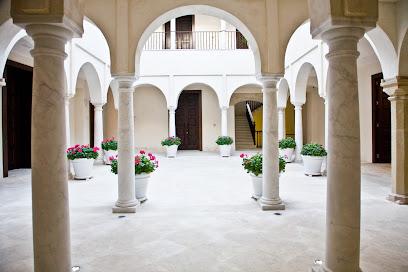
Essential places to dine
L'expérience
0.0 km
Discover the essence of Mediterranean cuisine at L'expérience in Málaga - where tradition meets modern culinary artistry.
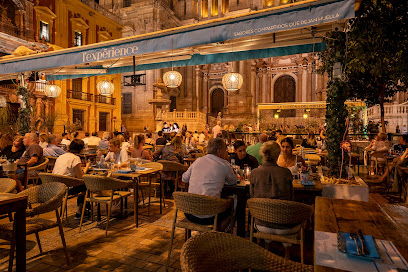
Blossom Restaurant
0.1 km
Discover Blossom Restaurant in Málaga - where Mediterranean elegance meets modern culinary artistry for an unforgettable dining experience.
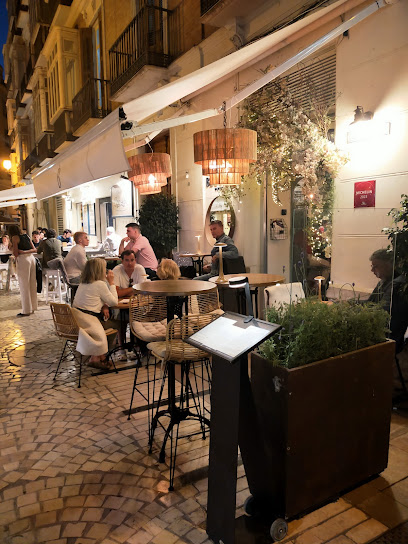
La Barra de Zapata
0.1 km
Experience authentic Mediterranean flavors at La Barra de Zapata – where every dish tells a story of Málaga's rich culinary heritage.
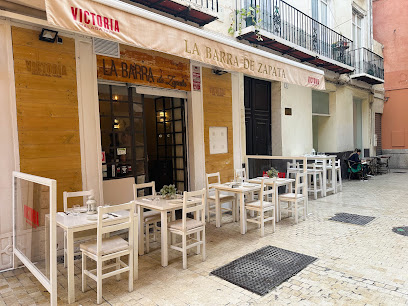
Palocortado Málaga
0.1 km
Discover exquisite dining at Palocortado Málaga, where traditional Andalusian flavors meet modern culinary artistry in an elegant setting.

KORTXO
0.1 km
Experience culinary artistry at KORTXO: A fusion restaurant in Málaga serving elevated Spanish classics in a vibrant atmosphere.

Comparte Gastrobar
0.1 km
Discover the flavors of Spain at Comparte Gastrobar, where culinary excellence meets local charm in the heart of Málaga.

Restaurante La Reserva 12
0.1 km
Experience the essence of Mediterranean cuisine at Restaurante La Reserva 12 in Málaga – where every meal tells a story.
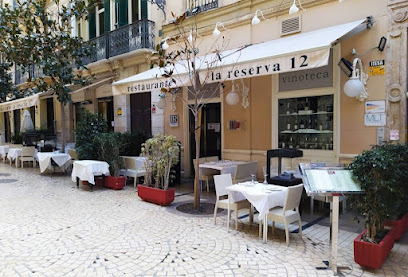
Amigos Málaga Centro
0.1 km
Discover the vibrant culinary fusion at Amigos Málaga Centro with exquisite Indian and Mexican dishes crafted for every taste.
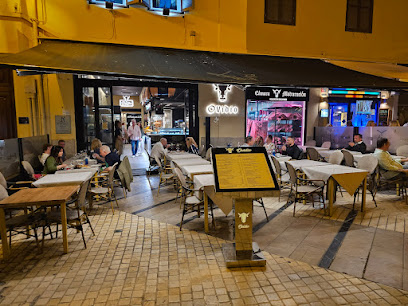
El Refectorium Catedral
0.1 km
Discover authentic Mediterranean flavors at El Refectorium Catedral, a traditional Spanish restaurant in Málaga's historic center.
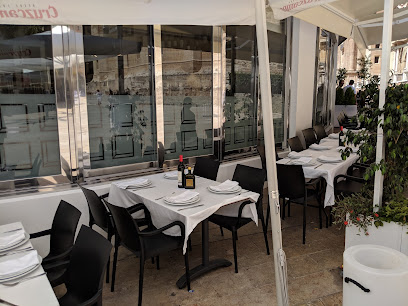
La ristobottega
0.1 km
Experience authentic Italian cuisine at La Ristobottega in Málaga – where every dish tells a story.

Restaurante El Jardín 1887
0.1 km
Experience authentic Andalusian cuisine at Restaurante El Jardín 1887 in Málaga - where every dish tells a story!
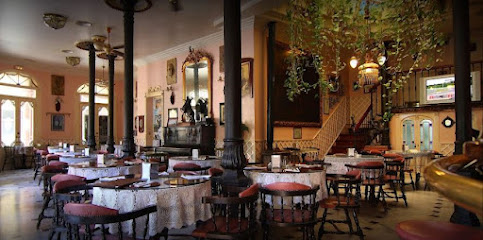
Mura Mura Osteria | Centro de Málaga
0.2 km
Experience authentic Italian cuisine at Mura Mura Osteria in Málaga's vibrant Centro district - where every meal is a celebration of Mediterranean flavors.
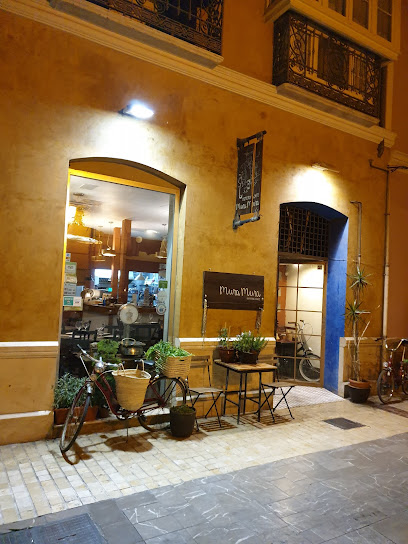
restaurante mosaico
0.2 km
Discover the rich flavors of Moroccan cuisine at Restaurante Mosaico in Málaga—where tradition meets innovation in every dish.
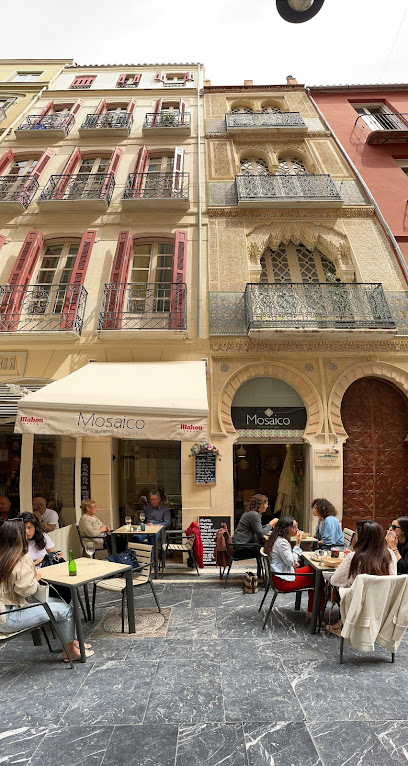
Beluga - Mediterranean Restaurant
0.2 km
Experience culinary artistry at Beluga - where Mediterranean flavors meet modern European flair in the heart of Málaga.
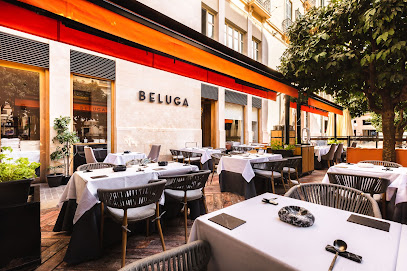
Kraken Centro - Tapas Restaurant
0.2 km
Experience authentic Spanish tapas at Kraken Centro in Málaga - where flavor meets tradition in every bite.
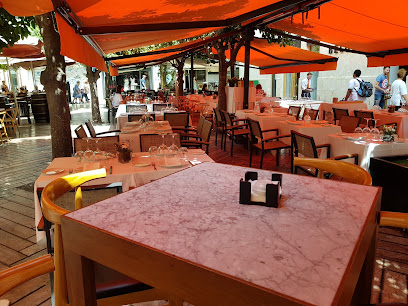
Markets, malls and hidden boutiques
Coquette Boutique Málaga
0.1 km
Explore the stylish collection at Coquette Boutique Málaga, where fashion meets elegance in the heart of the city.

Flamenco4you
0.1 km
Explore Flamenco4you in Málaga for authentic gifts, clothing, and pottery that celebrate the spirit of Andalusian culture.

Malìparmi Malaga
0.1 km
Explore Malìparmi Malaga: A Boutique Destination for Unique Fashion and Accessories in the Heart of Málaga.

Boutique PANDORA
0.1 km
Explore Boutique PANDORA in Málaga for exquisite jewelry and fashion accessories that embody elegance and style.
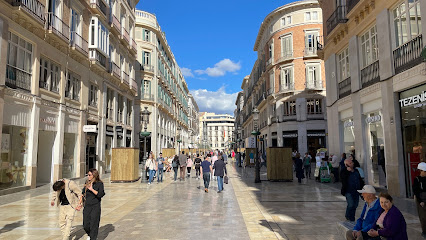
D´ Málaga
0.1 km
Explore D´ Málaga: Your Gateway to Authentic Souvenirs and Local Artistry in the Heart of the City.

MANGO
0.1 km
Discover contemporary women's fashion at MANGO in Málaga's vibrant Centro district, blending style and affordability in a chic shopping destination.
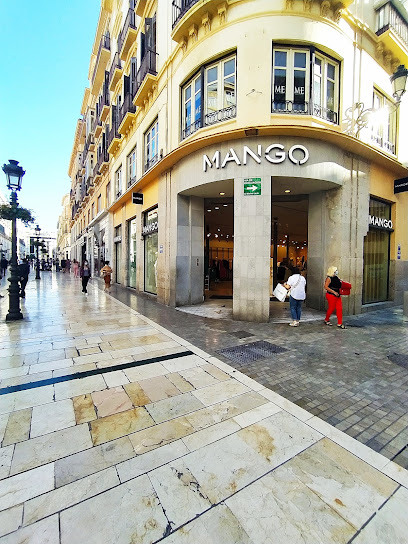
Sabor a España
0.1 km
Experience the Authentic Flavors of Spain at Sabor a España, Málaga's Premier Gourmet Grocery Store.
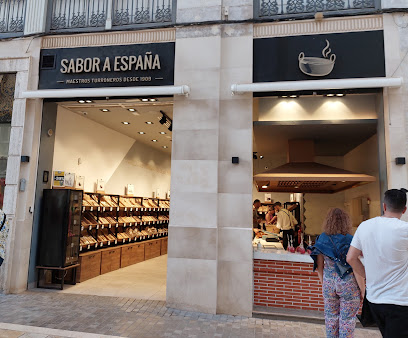
Fusión.Málaga
0.2 km
Explore Fusión.Málaga for a stylish shopping experience filled with trendy clothing, chic accessories, and fashionable footwear in the heart of Málaga.

Victoria's Secret
0.2 km
Discover the iconic Victoria's Secret in Málaga, where fashion meets luxury in a stunning clothing store experience.
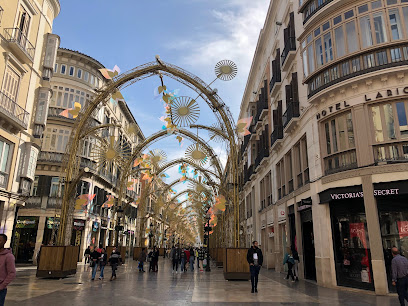
Sensse Boutique Málaga
0.2 km
Explore Sensse Boutique Málaga for unique, stylish dresses and accessories that capture the vibrant essence of Málaga's fashion scene.

Stradivarius
0.2 km
Discover modern fashion at Stradivarius in Málaga – a must-visit women's clothing store for chic styles and vibrant accessories.
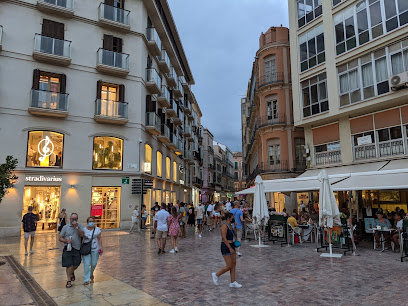
Nice Things Paloma S.
0.2 km
Explore the vibrant fashion scene at Nice Things Paloma S., where unique dresses and accessories await in the heart of Málaga.

ZARA
0.2 km
Discover stylish trends in the heart of Málaga at ZARA, where fashion meets affordability for the modern traveler.

ALE-HOP
0.2 km
Discover unique souvenirs and stylish home goods at ALE-HOP, the ultimate gift shop in the heart of Málaga, offering a taste of local culture.
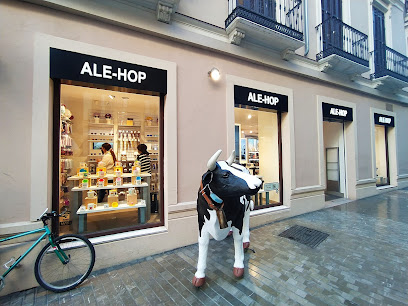
Boutique Nespresso Constitución
0.2 km
Experience the essence of coffee culture at Boutique Nespresso Constitución in Málaga, where quality meets elegance in every cup.
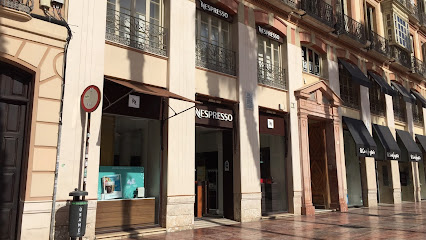
Essential bars & hidden hideouts
Moonlight - Bar de Copas
0.1 km
Experience the vibrant nightlife at Moonlight - Bar de Copas in Málaga, offering crafted cocktails and a lively atmosphere for unforgettable evenings.

Sherlock Holmes
0.1 km
Discover the charm of Sherlock Holmes pub in Málaga, a perfect blend of classic British hospitality and a vibrant cocktail scene.

CHLOE Bar - Málaga
0.1 km
Discover CHLOE Bar in Málaga: A cocktail haven with vibrant nightlife and a welcoming atmosphere perfect for tourists.

Premier Room Center
0.1 km
Discover the lively atmosphere of Premier Room Center, a must-visit pub in the heart of Málaga, for a taste of local nightlife and culture.
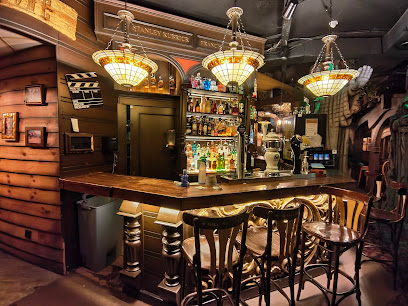
Renard Cocktail Club
0.2 km
Discover the vibrant atmosphere and innovative cocktails at Renard Cocktail Club, Málaga's premier destination for cocktail enthusiasts.

Con-bo Strachan Bar
0.2 km
Discover the lively Con-bo Strachan Bar in Málaga, where great drinks and a vibrant atmosphere await in the heart of the city.

Chester & Punk - Málaga
0.2 km
Discover Chester & Punk in Málaga for an exceptional cocktail experience with artistic drinks and a lively atmosphere, perfect for night owls.

Bar Urbano
0.3 km
Experience the vibrant nightlife at Bar Urbano, Málaga's lively bar for great drinks and a welcoming atmosphere.

Morrissey's Irish Pub
0.3 km
Experience the warmth of Irish hospitality at Morrissey's Irish Pub in Málaga, where live music, delicious food, and great drinks await.

La Terraza De Valeria
0.3 km
Discover La Terraza De Valeria, a stylish rooftop bar in Málaga offering stunning views, exquisite cocktails, and an unforgettable atmosphere for all visitors.

ZAS
0.4 km
Experience the vibrant nightlife of Málaga at ZAS, where expertly crafted cocktails and a chic ambiance await you.
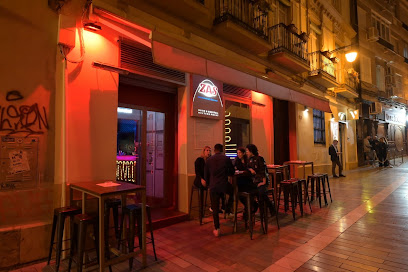
Cocktail Bar La Mamba
0.4 km
Discover the vibrant nightlife at Cocktail Bar La Mamba, where creative cocktails and a lively atmosphere await in the heart of Málaga.
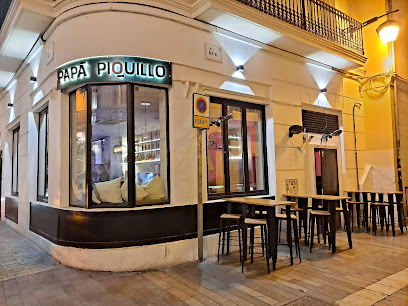
Mojito Bar
0.4 km
Experience the vibrant Mojito Bar in Málaga, where exquisite cocktails and a lively atmosphere promise an unforgettable night out.
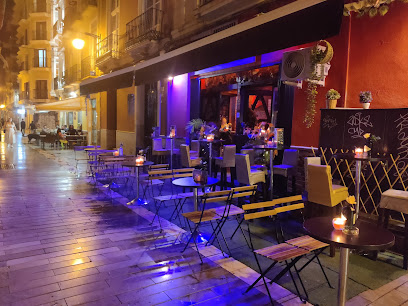
Bar Indiana
0.4 km
Experience the vibrant nightlife at Bar Indiana, where locals and tourists come together in the heart of Málaga for cocktails and camaraderie.

Road House
0.4 km
Discover the lively Road House in Málaga, where blues, jazz, and rock music come alive in a charming dive bar atmosphere.
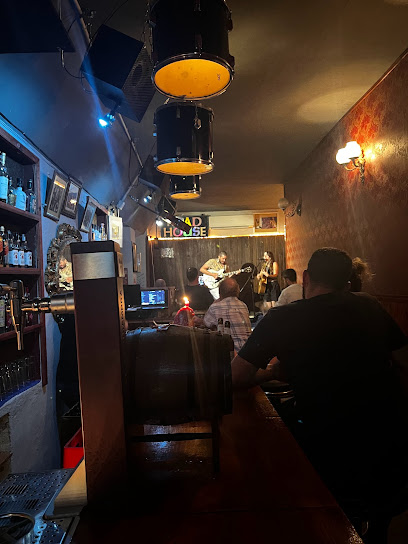
Nightclubs & after hour spots
Cathedral Club
0.1 km
Discover the vibrant nightlife at Cathedral Club, Málaga's premier disco club where music and dance come alive in a unforgettable atmosphere.

Liceo de Málaga
0.2 km
Discover the vibrant nightlife of Málaga at Liceo de Málaga, a premier disco club where music and dancing come alive.

Barsovia Club
0.2 km
Discover the vibrant nightlife of Málaga at Barsovia Club, where disco meets live piano music for an unforgettable evening.

Sala Gold
0.2 km
Discover the electrifying nightlife of Málaga at Sala Gold, a premier disco club offering vibrant music and an unforgettable party atmosphere.

Bambu
0.3 km
Experience the electrifying nightlife of Málaga at Bambu, the ultimate night club featuring top DJs, vibrant ambiance, and exquisite cocktails.

Tennessee Live Club Málaga
0.3 km
Dive into the heart of Málaga's nightlife at Tennessee Live Club, where music, dance, and fun collide in an unforgettable experience.
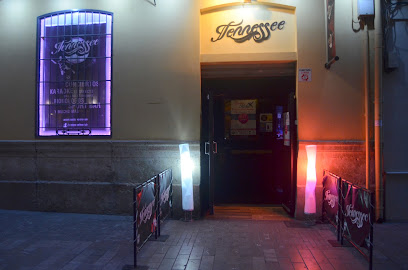
Mirror Málaga
0.3 km
Dive into the heart of Málaga's nightlife at Mirror Málaga, where exceptional music and vibrant energy come together for an unforgettable night.

Gallery Club Malaga
0.3 km
Dive into the exhilarating nightlife of Malaga at Gallery Club, the premier destination for unforgettable music and dance experiences.

Theatro Club Málaga
0.3 km
Experience the vibrant nightlife of Málaga at Theatro Club, where electrifying music and thrilling performances create unforgettable memories.

Velvet Club Málaga
0.3 km
Dive into the vibrant nightlife of Málaga at Velvet Club, a premier disco club offering an electrifying experience in the heart of the city.
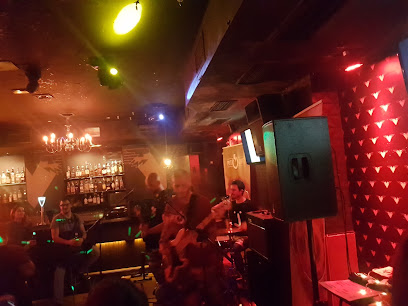
Discoteca Andén
0.3 km
Experience the vibrant nightlife of Málaga at Discoteca Andén - the ultimate disco club for dancing and socializing until dawn.

BUBBLES CLUB
0.3 km
Experience the vibrant nightlife at Bubbles Club in Málaga, where music, dancing, and an electric atmosphere combine for unforgettable nights.

Santorini Club Malaga Centro
0.4 km
Discover the electric nightlife of Málaga at Santorini Club, where music, dance, and unforgettable memories await in the heart of the city.

Pub Stereo
0.4 km
Discover the energy and excitement of Málaga's nightlife at Pub Stereo, a vibrant nightclub in the heart of the city, perfect for dancing and socializing.

Cabaret Music Club
0.4 km
Discover the electrifying nightlife of Málaga at Cabaret Music Club, where every night is filled with music, dance, and unforgettable performances.




